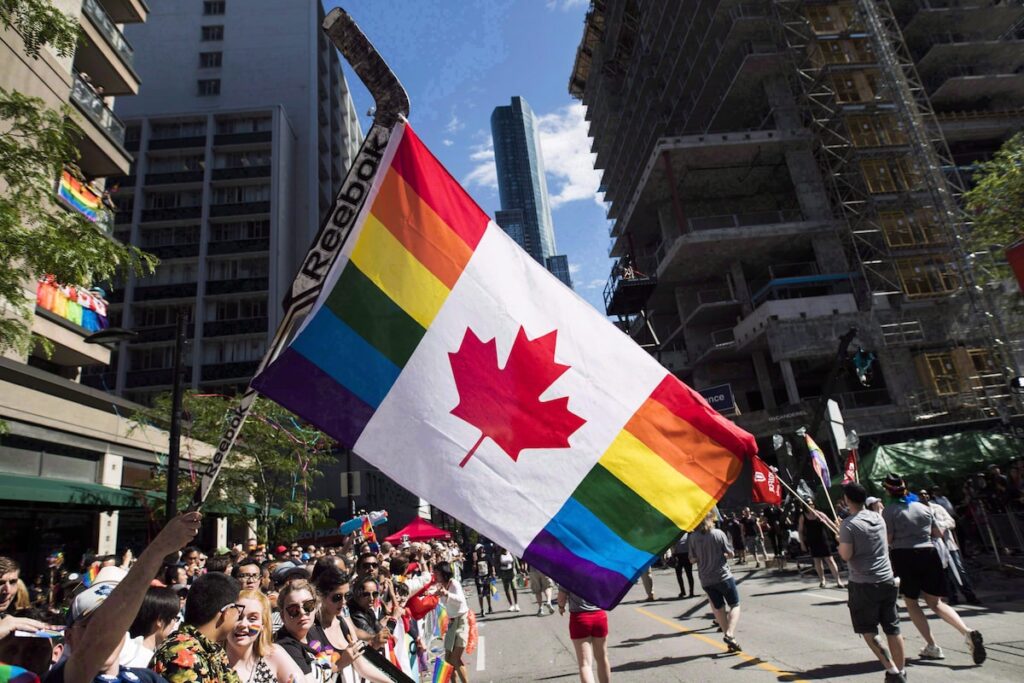Owen Guo is a Toronto-based freelance writer.
As the Pride floats passed excited onlookers on a sunny day in Vancouver, it wasn't the topless men who looked like Calvin Klein models that made my heart flutter.
In 2017, I had just turned 30 and hadn't yet come out. A Pride newbie, I saw queer people of different skin tones strolling the streets, dancing and chanting slogans of love and solidarity. Marching alongside them were toddlers waving Pride flags and dogs wearing rainbow bow ties. After years of not coming out in China, I finally felt like I belonged here.
That is, until I opened the dating app Grindr later that week.
When I said hello, one guy retorted, “Nobody's looking for Asians!” Another, upon learning I was Chinese, replied, “I don't sleep with Chinese people because of what the Chinese government did in Tibet.” Both were white.
It was as if the inspiring chants I heard at the Pride parade had turned into a flood of online insults from fellow gay men in the middle of the happiest time of the year, all in a city that is as Asian as it is gay.
As we mark another Pride Month in Canada, I'm reminded of a harsh and inconvenient truth: the gay community that projects an image of inclusion and solidarity can also perpetuate discrimination within its own ranks.
This is a well-documented problem. A 2012 paper from York University based on interviews with queer people in Toronto, where I currently live, found that “intergroup and broader institutional racism permeates the LGBTQ community, rendering the lived experiences of many LGBTQ people of color invisible.” A 2015 FS Magazine survey found that 80% of black men and 79% of Asian men experience racism in the UK gay scene. And a 2021 survey of South Asian gay and bisexual men in the Greater Toronto Area paints a similar picture. Many respondents reported “feeling alienated from the predominantly white gay community,” which led to “experiences of loneliness and social isolation.” While phrases like “no fat people, no women, no Asians” may not be as common on dating apps today, racist slurs and taunts can still happen.
Consider the anecdotes of racism depicted in Canadian media: A Toronto man told CBC he was once called a “preferred black person” online, while an Iranian gay man told The Tyee he'd been called a terrorist on apps and in gay bars and told to “go back to your country.”
As a relative newcomer to both Canada and the gay community, this was shocking. After all, the LGBTQ movement that gave us Pride Month was born out of mass protests against hate, prejudice, and injustice. The gay community has marched against police raids and for equal rights and fair treatment. We have worked to end discrimination of all kinds everywhere, from corporate boardrooms to bathrooms.
Gays have come a long way. Until 1969, sexual activity between men was considered a criminal offense in Canada. Just over 30 years later, in 2003, Canada moved to legalize same-sex marriage. Today, gays in Canada enjoy strong protections in the workplace and rainbow signs are displayed in many public places.
I've come a long way, too. When I was young in China, I made every effort to hide that I was attracted to men. When friends asked me about my love life, I would lower my voice and repeat the excuse that I was too picky with women. I even considered marrying a lesbian just to appease my parents.
The closet that once held me back is gone. Moving to Canada was a chance to reboot my life and connect with a community I never really knew before. I'm grateful for the freedom that Canada has given me, a freedom I never dreamed of back home.
Sadly, coming out doesn't necessarily mean solidarity.
These days, I often find myself navigating multiple layers of identity, like a minority within a minority group: being gay is celebrated in Canada, but being gay and Asian can feel like a different world.
As cities across Canada get into the swing of Pride celebrations this month, we should feel free to celebrate the progress LGBTQ people have made. But we must not forget that at the heart of the LGBTQ movement was a unified demand for equal treatment. To truly honour the spirit of that movement, we need to learn to treat each other with respect and dignity.



